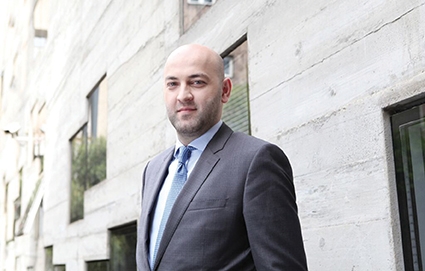Anaklia Development Consortium Signs Agreement with SSA Marine
Interview
August 1st sees the official signing ceremony of the agreement between the Anaklia Development Consortium and SSA Marine. SSA Marine is considered to be one of the largest terminal operators in the world, with 250 strategic operations across the five continents, serving 27.2 million containers (TEU) as it manages terminals across 9 countries. The signing is a landmark moment marking the US-based company’s move to become Anaklia Deep Sea Port’s terminal operator. GEORGIA TODAY met with Levan Akhvlediani, Chief Executive Officer of the Anaklia Development Consortium, to talk about this momentous occasion and more generally about the overall vision for the Anaklia Project Development.
Tell us more about the signing of the agreement between Anaklia Development Consortium and SSA Marine. Why is it important?
Anaklia Development Consortium agreed on cooperation terms with SSA Marine, and are now signing the agreement. It’s a key agreement, since the operation of the terminal is a specific task which needs to be done by a specialized company, also being a necessity for us as the developers of the project.
How would you highlight the economic and social impact of the Anaklia Deep Sea Port Project on the country?
I think it will have a tremendous economic effect on the country, and regionally as well, of course, because the Port will be serving not only Georgia but also the southern Caucasus and central Asia which is landlocked, and here we’re talking about hundreds of millions of dollars of added economic value; we’re talking about initially hundreds, and then thousands of jobs, both direct and indirect. That’s why I think the impact will be extremely positive.
Is the Anaklia Deep Sea Port competing with Poti and Batumi ports?
Georgia has no other deep sea port and that’s why we’re building one. We need to build Anaklia Deep Sea Port in order to stay competitive as a corridor- the port will serve Georgia and the region for the next 100 years, because we’re talking about a hundred million-ton port with the most modern infrastructure. To a certain extent, we will be competing with Poti and Batumi, however, mainly we will be directly competing with other ports and corridors, such as the Iranian, the Russian, and the Baltic corridor. As a transit country, it’s very important for Georgia to maintain that competitive advantage of our corridor, and I would say the Anaklia port is one of the key components of maintaining that advantage in the short, medium and long term. That’s our main vision: we want to attract more transit cargo, which unfortunately we’ve lost over time due to lack of infrastructure, which has led to inefficiencies, and those inefficiencies in turn led to a lack of competitive advantage.
What stage is the Anaklia Deep Sea Port project at right now?
We’ve completed the preliminary design, which we’ve already submitted to the government. Hopefully, we’ll get approval for that by mid-September after the government evaluates it. Next, we’ll get the construction permit and by the end of this year we will start the mobilization of construction works. We issued the Environmental Impact study at the beginning of June and we’re having public hearings in Zugdidi and Anaklia. We’re working very hard to get an environmental permit for the project. We’ve finished all the feasibility studies which were needed for the preliminary design; it was a rigorous, intense process that started last July 2016 and went all the way through to March. We’ve finished all the feasibility studies. In terms of investments and fundraising, we have a number of pipeline investors lined up and we’re positive that by the end of this year, we’ll be able to financially close and start construction.
Tell us more about Anaklia City
Initially, when we started the Anaklia Deep Sea Port project, we said that we didn’t want just a port, but to also have a free industrial zone. Then we looked closer, did more analysis and said, look, the free industrial zone is good, but we need something new, with a broader vision, something that can really make Anaklia an interesting business hub. We felt that we had to broaden our appeal to different sectors. We had a company named Anaklia Free Industrial Zone and we changed its name to Anaklia City, which now encompasses the development of the industrial zone and the development of a city with other sectors like banking, financing, retail, and real estate. That way, we aim to appeal to broader sectors of the economy and make Anaklia potentially a very special regulatory zone. We’ve seen a lot of demand regionally. We need a kind of administrative hub that can house and feed the demand and supply of many sectors, and Georgia has very good potential, especially now that we’ve signed the Free Trade Agreement with the EU. We’re very well-positioned and, with a bigger push, we can achieve an even friendlier business climate. To give you a long-term vision, we’re talking about Hong-Kong, or, potentially, Singapore; we’re talking about the world’s companies establishing their businesses in Anaklia.
Where do you think the project will be in 20 years’ time?
In 2037, Anaklia will be a fully-functioning logistics hub in the region, connecting the West with central Asia, and vice-versa, with China and Silk Road aspirations. Anaklia will be a big player in the region. We will have created a city that houses business persons, Georgians and foreigners, across the region, who create economic value for themselves, for the region, and for Georgia, that also solidifies Georgia’s role and image as a place for doing business. I think that’s what we’re aspiring to, talking about twenty years from now.
Nino Gugunishvili











